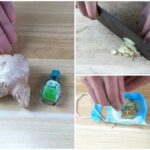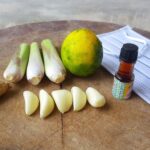Fresh ginger has a strong, spicy, and distinctive aromatic flavor that enhances the taste of dishes. However, fresh ginger is prone to drying out and losing its flavor if not stored properly. When ginger loses moisture, its skin becomes wrinkled, and the root becomes hard and difficult to work with. Moreover, moldy ginger not only diminishes its quality but can also be harmful to one’s health.
Should you store ginger in the refrigerator?
Storing ginger in the refrigerator is a sensible option if you’ve purchased too much and want to keep it for an extended period. However, to ensure that ginger retains its flavor and quality, it must be done correctly.
Storing ginger in the refrigerator can prolong its lifespan, especially during hot or humid weather. The cool temperature slows down moisture loss and keeps ginger fresher for longer compared to leaving it at room temperature. Additionally, the cold environment can inhibit mold growth, preventing spoilage.

Storing ginger in the refrigerator is a sensible option if you’ve bought too much. (Photo: The Spruce Eats)
However, keeping ginger in the refrigerator can alter its texture and flavor. The cold temperature can make ginger harder to grate or slice. Simultaneously, ginger may absorb moisture from the refrigerator’s environment, resulting in softening and loss of crispness. Furthermore, if not adequately sealed, ginger can absorb odors from other foods in the refrigerator, affecting its flavor.
How to store ginger in the refrigerator
If you decide to store ginger in the refrigerator, here are some tips to ensure it stays fresh and flavorful:
Use plastic bags or airtight containers
To store ginger in the refrigerator, wrap the root tightly in a plastic bag or place it in an airtight container. This prevents ginger from being exposed to cold, damp air, reducing the risk of softening and flavor loss. Plastic bags or airtight containers also help prevent odors from other foods from affecting the ginger.
Do not peel before storing
If you intend to store ginger long-term in the refrigerator, it’s best not to peel it. The skin acts as a natural protective layer, helping ginger retain moisture and flavor while safeguarding it from mold and bacteria. Only peel the ginger when you’re ready to use it.
Cut into small pieces and freeze
If you’ve purchased more ginger than you can use in a short period, consider cutting it into small pieces (slices or cubes, depending on your preference) or grating it, then placing it in a plastic bag and freezing it. When needed, take out a small amount of frozen ginger and add it directly to your dish.
However, note that frozen ginger may lose a slight bit of its flavor compared to fresh ginger.
Other ginger storage methods
Apart from refrigerator storage, there are alternative methods to maintain ginger’s flavor and quality for extended periods.
Room temperature storage
If you’ve only purchased a small amount of ginger and plan to use it within a few weeks, you can store it at room temperature. Keep ginger in a cool, dry, and well-ventilated area, avoiding direct sunlight. Place it in a paper or cloth bag to keep it dry and prevent mold.
Soak in alcohol or vinegar
A traditional preservation method is to soak ginger in alcohol or vinegar. This technique not only prolongs its shelf life but also adds a unique flavor to the ginger. Ginger soaked in alcohol or vinegar can be used directly in cooking or mixed into beverages.
Store ginger in sand
Storing ginger in sand is a straightforward yet effective method. Simply use a wide dish or basket, fill it with clean, dry sand, bury the ginger underneath, and keep it in a cool, ventilated area.
This technique helps keep ginger fresh and prevents it from drying out.
Dehydration
Drying ginger through sun exposure or dehydration is another long-term preservation method. Once dried, you can grind the ginger into a powder or cut it into slices for gradual use. Dried ginger can be stored at room temperature for several months without spoilage.
According to VTC News







































